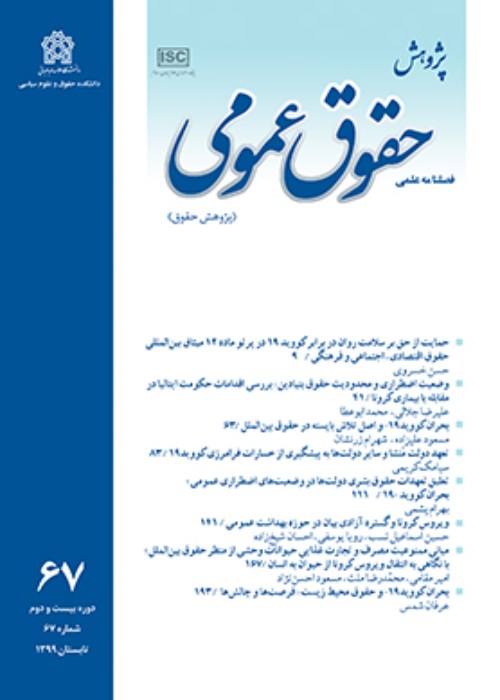Hannah Arendt; The Constitution and Constituent Power
Although Hannah Arendt cannot be called a theorist of constitutional law, her brilliant reflections on some legal concepts have given her thought a special dimension. She, who was always interested in the public domain and political thought issues, realized the importance of some legal concepts, especially constitutional law. Constituent power and constitution are two important concepts in Arendt's thinking. Arendt's distinctions between the American and French revolutions are actually a way to understand the Constitution and the Constituent power in her thoughts. Knowledge of law and legal concepts also have an important place in Arendt's thought. It is necessary to deal with these researches for several reasons; these studies link legal issues to political and philosophical ideas, help advance matters related to the theories of constitutional law, and make the Constitution distance itself from text-oriented positivist views that ignore history and reality.Research Question(s) This article seeks to answer the question: “What Arendt's understanding is of the constitution and Constituent power as the creator of the constitution, and how she examines the different nature of the French and American revolutions to explain the concept of the constitution and Constituent power”.Literature Review The interpreters of Arendt's thought have mostly neglected the importance of the concept of the constitution in her thinking, but in recent decades, especially with the rising influence of Carl Schmidt's ideas in constitutional law, many have relied on Arendt to criticize Schmidt’s ideas. Also, essays and books were written about Arendt's legal philosophy. Even though that many of Arendt's works have been translated into Persian, her legal theories have never been discussed. The only thing that can be seen in the Iranian legal literature about Arendt is her criticisms of the concept of human rights.
In this article, we have researched and discussed issues with a descriptive-analytical method and by relying on the writings of Arendt and her commentators.
The constitution and constituent power are connected. The constitution is considered the most important legal document of a country. It is written by the constituent power which constituent power belongs to the people and the sovereignty of the people -sovereignty means the superior power to give orders. Arendt, fully familiar with the issues and theories of constituent power, makes a distinction between the American and French experiences regarding constituent power in order to explain constituent power and criticize it. Arendt understood constituent power very differently from what Schmidt theorized so complicatedly. Both Schmidt and Arendt have emphasized the role and power of people. For Schmidt, this power is absolute and beside the constitution, but for Arendt, it is limited and derived from the authority of pre-existing institutions. Also, both Arendt and Schmidt are indebted to Max Weber’s thinking. Arendt also stands against the constituent power and general will theories in the thought of Sieyès. According to Arendt, Sieyès has claimed the constituent power i.e., the nation to be a permanent state of nature. She has tried to criticize the supporters of public will and the strong role of the people. According to Arendt, emphasis on the will of the people makes the law in totalitarian governments a tool for the government, as a representative of the people which it can easily use to violate the constitution.She also discussed the concept of law based on what she theorized about constituent power and the Constitution. Arendt believed that the people, as the constituent power, write the constitution, but the ordinary law that is written in the parliament is no longer under the absolute will of the people and is bound and limited by the constitution. According to Arendt, in both the Roman and Greek experiences, law was man-made. The Greek nomos and the Roman lex did not have any divine origin and there was no need for legislation that was outside and above the laws, and there was no need to obtain inspiration from God. The concept of divine law required that the legislator be outside and above the circle of laws that he enacts. Arendt's analysis of Rousseau's influence on the evolution of the French Revolution led her to the conclusion that since then, the concept of the nation led to the idea that law should be the product of the people’s will, and thus the concept of law gained a new meaning thereafter.
Hannah Arendt is one of the most important thinkers of the 20th century. Her thought system covers a wide and complex purview, and commentators of her thought have discussed various philosophical, political, and social aspects of her theories. One of the important aspects of Arendt's thinking is her legal philosophy, which has been less discussed than other aspects. Her legal philosophy covers a wide area in the philosophy of law, criminal law, international law, human rights, constitutional law, and administrative law, analysis of which requires writing numerous articles. In this article, only one of Arendt's theories, namely the constitution and its relationship with the constituent power, was discussed. For a more precise understanding of the Constitution, one refers to its author, that is, constituent power. Her understanding of the constituent power is different from the Western European tradition, from Sieyès to Carl Schmidt, and criticizes the exaggeration of the role of the people. Undoubtedly, the fate of the Weimar Republic and the bitter experience of 20th-century Europe, the emergence of totalitarian regimes in Germany and the Soviet Union, and her life experiences in America have influenced these ideas. regard to Arendt is increasing day by day in the world of legal thought and philosophy, and many aspects of Her thinking still need to be discussed.
- حق عضویت دریافتی صرف حمایت از نشریات عضو و نگهداری، تکمیل و توسعه مگیران میشود.
- پرداخت حق اشتراک و دانلود مقالات اجازه بازنشر آن در سایر رسانههای چاپی و دیجیتال را به کاربر نمیدهد.


